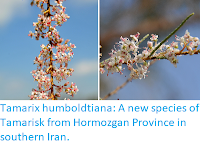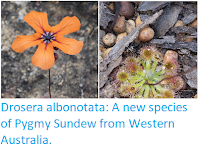Dogbanes, Apocyanaceae, are flowing trees, shrubs, herbs, succulents, and vines found in tropical, subtropical and occasionally temperate regions of Europe, Asia, Africa, Australia and the Americas (tree forms are mostly restricted to tropical forests, and sometimes deserts). Many of these plants are toxic, and some have been used to poison Dogs (hence the name), and a number of pharmacological products have been derived from them. Members of the genus Cynanchum are climbers producing white latex, sometimes known as Swallowworts or Dog-stranglers.
In a paper published in the journal Taiwania on 14 June 2019, Jian-Yong Shen, Xing-Da Ma, Wen-Guang Wang, and Ji-Pu Shi of the Xishuangbanna Tropical Botanical Garden describe a new species of Cynanchum from Menghai County in Yunnan Province, China.
The new species is named Cynanchum brevipedunculatum, meaning 'short peduncle' (flower stem), as it has short peduncles. The species is a climber with larger leaves than related species, and shorter flower stems. It produces paired bracts of green and white flowers in November. Only two specimens of the species could be found despite an extensive search, for which reason Shen et al. recommend that the species be classed as Critically Endangered under the terms of the International Union for the Conservation of Nature's Red List of Threatened Species.
Cynanchum brevipedunculatum. (A) Habit. (B)-(C) Adaxial and abaxial leaf surface. (D)-(E) Inflorescences and flowers. (F) Gynostegium in side view. (G) Gynostegium in top view. (H) Pollinarium. Shen et al. (2019).
See also...







